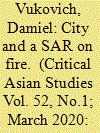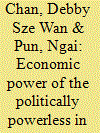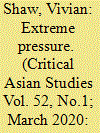|
|
|
Sort Order |
|
|
|
Items / Page
|
|
|
|
|
|
|
| Srl | Item |
| 1 |
ID:
171026


|
|
|
|
|
| Summary/Abstract |
The 2019 protests in Hong Kong have been a watershed moment for the city, both politically and socially. These protests have, for some residents, transformed the police–society relationship into one of open antagonism, fully exposed people’s fear and loathing of the mainland and their local government, and divided some families and large segments of society. These events have also caused an ordinarily quiet and civil society to become violent, enraged (at the police and government), openly racist/xenophobic, and emotionally traumatized. And yet it is highly unlikely that the outcome will be the direct nomination and election of the city’s chief executive, let alone either de facto independence or full autonomy from the mainland. But this reality will not stop demands by the pan-democrats and other opposition members directly involved in this protest movement. This is becoming a chronic, painful condition of stasis for Hong Kong as a political entity and society. There has to be compromise and yet none is forthcoming.
|
|
|
|
|
|
|
|
|
|
|
|
|
|
|
|
| 2 |
ID:
171028


|
|
|
|
|
| Summary/Abstract |
This commentary seeks to stimulate discussion about grassroots resistance that has taken on conglomerates in the faceless and leaderless 2019 pro-democracy movement in Hong Kong. The scale, scope, and time span of these protests is unprecedented in the city and, at the time of writing, there is no sign they will soon abate. Behind eye-catching scenes of black-clad protesters filling the streets, a sea of light in assemblies, rounds and rounds of tear gas fired by police, people covered in blood, and burning shops, is an emerging economic resistance movement that aims to generate alternative political resources in an acutely imbalanced bargaining structure between protesters and the government.
|
|
|
|
|
|
|
|
|
|
|
|
|
|
|
|
| 3 |
ID:
171032


|
|
|
|
|
| Summary/Abstract |
Situated in the emergence of hate speech and anti-racism counter protest in Japan, this article poses two questions: why do activists enact exclusions while attempting to fight against social inequality, and how do interpretations of gender shape activists’ understandings of anti-racism? This article explores three findings: activists conceptualize the risk of being targets of hate speech and abuse as both gendered and racialized; anti-racist activists interpret anti-racism as a practice of redirecting vulnerabilities – a practice that is, itself, gendered; and anti-racist activist communities struggle with ambivalence around masculinity and other “gender problems.” Although gender functions as a key lens through which anti-racism is conceptualized, movements devoid of an intersectional feminist analysis encounter exacerbated difficulties in resolving internal problems such as sexual harassment. This article focuses on the theme of vulnerability, which is enmeshed with the vocabulary of gender. Through analyzing vulnerability, this article offers an ethnographic account to explain why the reproduction of inequalities persist, even within social justice movements that aim to promote equality.
|
|
|
|
|
|
|
|
|
|
|
|
|
|
|
|
| 4 |
ID:
171029


|
|
|
|
|
| Summary/Abstract |
Scholars have long identified the pivotal importance of business-led governance in the Hong Kong and Macau Special Administrative Regions (SAR) of China. Both are governed under a “one country, two systems” arrangement which in theory provides autonomy. However, this identical formula has resulted in very different trajectories, as the coalition in Hong Kong has failed to serve as an effective intermediary between the state and society amidst a series of governing crises, whereas the one in Macau has been largely successful in maintaining political stability. This article argues that a new class of elites in Macau has emerged and competes for political influence by building communal networks and mobilizing social support. In contrast, a relatively static elite structure in Hong Kong has done little to adapt to changing political circumstances.
|
|
|
|
|
|
|
|
|
|
|
|
|
|
|
|
| 5 |
ID:
171031


|
|
|
|
|
| Summary/Abstract |
South Korea’s anti-multiculturalism discourse – the rejection of migrants and of a multicultural future for South Korea – made inroads in progressive popular online forums in the 2010s. Through an analysis of two such forums, this paper shows how online discussions have made the explicit rejection of multiethnic coexistence palatable to a broad group of predominantly male liberal users through a process of “scapegoating” dark-skinned foreign workers and the children of multicultural families for precarity caused by state-driven neoliberalism. The users’ collective discussions do contain some critiques of the neoliberal coalition of corporations, government, and media that have deployed multicultural policies. However, the popular political dynamics of online space enable users to focus on racial Others, who are more available as scapegoats in gendered, racialized, and classed ways – presenting dark-skinned migrants as accomplices and beneficiaries of the elite coalition allegedly taking rights from South Korean male citizens. These collective discussions justify xenophobia in the name of a progressive critique and preemptively stall discussion about a possible multicultural future for South Korea.
|
|
|
|
|
|
|
|
|
|
|
|
|
|
|
|
| 6 |
ID:
171033


|
|
|
|
|
| Summary/Abstract |
Since the beginning of Thailand’s protracted political crisis in 2005, the country has experienced a conservative political turn centered on the monarchy. One of the regions where this turn has been most pronounced has been in southern Thailand. Studies of the south have tended to focus on the border provinces, its Malay Muslim community, and a long-running separatist movement. The more populous parts of the upper south with a Thai-Buddhist majority have been largely overlooked. In recent decades the south’s old Buddhist heartland has witnessed a high level of cultural and religious dynamism. This region has given birth to an influential new academic field of southern Thai studies and a distinctive southern Thai literature. These factors have contributed to the hardening of a southern Thai Buddhist identity. Politicians and activists from the south have played a prominent role in Thailand’s on-going political crisis. This article explores the rise of conservative radicalism in southern Thailand’s Buddhist heartland with reference to the roles of southern academics, writers, poets, activists, and politicians over the last half century. It offers a regional case study of the roots of Thailand’s political crisis as well as the rise of Buddhist radicalism in Southeast Asia.
|
|
|
|
|
|
|
|
|
|
|
|
|
|
|
|
| 7 |
ID:
171027


|
|
|
|
|
| Summary/Abstract |
One important aspect of the 2019 Anti-Extradition Bill (Anti-ELAB) movement in Hong Kong is a high degree of solidarity between the movement’s moderate and radical flanks. The solidarity has contributed to the movement’s sustainability and played important roles in its dynamic evolution. This essay attempts to explicate how the solidarity has been produced, maintained, and negotiated. It first outlines the changing relationship between the moderate and radical flanks of the city’s pro-democracy movement since the 2000s. It then explicates the social, experiential, and discursive bases of solidarity in the first five months of the Anti-ELAB movement. It illustrates the role of – as well as the limitations to – an ethics of solidarity in managing conflicts in intra-movement debates. General implications of the analysis on studies of social movements are discussed.
|
|
|
|
|
|
|
|
|
|
|
|
|
|
|
|
| 8 |
ID:
171030


|
|
|
|
|
| Summary/Abstract |
Over ten years before the deadly 2017 “Unite the Right” rally in Charlottesville, Virginia, Japan was reckoning with its own wave of Internet-fueled xenophobic activism in public spaces. Amid a second decade of recession in the early 2000s, nationalist activity coalesced in anonymous chat rooms and message boards in Japan. In contrast to the surprisingly inclusive space that prior rightist generations had inherited from imperial pan-Asian ideology and post-World War II experiences of shared social marginality, a new activist movement that came to be known as the Action Conservative Movement (ACM) pursued an aggressively xenophobic, racially framed form of nationalism, based not on the social margins but rhetorically grounded in the center of Japan’s middle-class society. This article identifies the centrality of self-made digital media and three genres of video work facilitating ACM mobilization of supporters from the virtual to the physical public sphere and explores issues around anonymity and truth telling such video work entails.
|
|
|
|
|
|
|
|
|
|
|
|
|
|
|
|
|
|
|
|
|